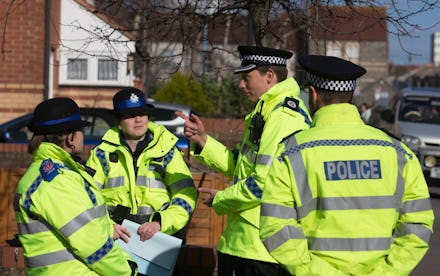UK Police Give Teens Victim-Blaming "Are You Asking For It?" Flyer

A state-run workshop for teens just took victim blaming to a whole new level.
British police distributed guides on "student safety" while hosting a student safety event at a school in North Bristol last week. The message emblazoned across the pamphlet's cover was simple yet chilling: "R U Asking 4 It?"
Students quickly shared their outrage on social media:
The Bristol Post reported that during the event police told young girls "they shouldn't drink on nights out" and offered advice implying it's the victim's job to prevent sexual assault from happening. The students reportedly got so upset that teachers had to intervene.
Local police have since issued a public apology and scheduled a second workshop with the students, this time with a slightly different message.
"The out-of-date leaflets contained information about vehicle crime and robberies in relation to student safety and have now been destroyed," the department's online statement said. "Any suggestion that a victim of rape or sexual assault can ever, in any way, be to blame is totally unacceptable ... the students were right to challenge the incorrect message."
According to the BBC, the police department destroyed the controversial pamphlets following student outrage. But unfortunately, this isn't an isolated incident. Police educators and schools alike often teach victims to blame themselves for sexual assault. The harmful messages are widespread, whether they are delivered explicitly via a sexual assault prevention curriculum or by example.
In 2012, Missouri teen Daisy Coleman was punished by her high school for her "involvement" in a cell phone video of her being raped by a fellow student. "I was suspended from the cheerleading squad and people told me that I was 'asking for it' and would 'get what was coming,'" Coleman wrote in an XOJane column about her experience. A 14-year-old sexual assault victim in Michigan suffered similar treatment in 2015, when she was suspended for "lewd and lascivious behavior," despite filing a police report and telling the school she was traumatized by the nonconsensual interaction.
Meanwhile, bringing in law enforcement officers to talk about sexual assault can have equally harmful results. In 2011, a police officer in Toronto delivered a speech to college students, saying "women should avoid dressing like sluts in order not to be victimized," according to The Guardian.
The recent case in Bristol has a happy ending: Ultimately, the teens managed to educate police about the right way to address student safety, including sexual assault prevention. Yet the takeaway from the story is clear: There's no hope of actually promoting "student safety" unless law enforcement stops shaming sexual assault victims.
Read more: